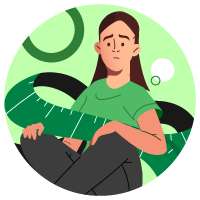Overview
- Anorexia nervosa is commonly anorexia, is an eating disorder characterized by excessively low body weight, intense fear of weight gain, and a distorted perception of weight.
- People suffering from anorexia place a high value on controlling their body shape and weight with extreme efforts that significantly affect their lives.
- Anorexia nervosa isn't all about food. It's a severe, unhealthy, and life-threatening way to cope with emotional problems. When you experience anorexia, you often associate thinness with self-worth.
- Anorexia treatment helps you get a better sense of who you are, return to healthier eating habits, and handles severe anorexia complications.
- No matter how much weight has been reduced, a person with anorexia continues to fear weight gain.

What is Anorexia Nervosa?

People with anorexia nervosa take an extremely low-calorie diet and have a fear of weight gain. They feel better when they reduce weight.
Anorexia Symptoms
The physical symptoms of anorexia are more about starvation. It also includes behavioral and emotional issues such as unrealistic body weight perception and a fear of becoming fat. It may be difficult to notice the signs of anorexia because low body weight is different for each person, and some people may not look extremely thin.
Physical Symptoms
Physical signs and symptoms of anorexia nervosa in a person may include:
- Excessive weight reduce
- Thin appearance
- Fatigue
- Insomnia
- Abnormal blood counts
- Fainting
- Low blood pressure
- Dehydration
- Arms or legs swelling
- Hair fall
- Menstruation problems
- Yellowish or dry skin
- Intolerance of cold

Emotional and Behavioral Symptoms
Behavioral anorexia’s symptoms involve weight loss by:
- Restricting food intake through fasting and dieting
- Excessive exercising
- Binging and self-induced vomiting to waste food
Emotional and behavioral signs of anorexia nervosa are:
- Frequently skipping meals
- Making excuses for not eating
- Constant weight checking
- Not eating in public
- Eating only low in fat and calories food
- Fear of gaining weight
- Wasting food after chewing
- Complaining about gaining weight
- Lack of emotion
- Irritability
Types of Anorexia
Anorexia nervosa is categorized into two general types:
- Restricting Type
- Binge Eating / Purging Type
People with this anorexia nervosa place restrictions on the quality and type of consumed food. It may include calories count, meal skip, and restrictions on certain foods. Weight loss occurs through fasting, dieting, or excessive exercise.
In this type of anorexia, there are periods of food intake compensated by self-induced vomiting, diuretic abuse, or excessive exercise.
Causes of Anorexia
The exact causes of anorexia are still unknown. People who have anorexia nervosa symptoms may have a negative body image. They may focus on looking "perfect." Some other factors such as biology, environment, and psychology are causes of anorexia nervosa.
| Causes | How They Affect A Person |
| Biological | Hormones and genetics have an impact on the development of anorexia. Some indications declare a connection between anorexia nervosa and serotonin, a chemical in the brain. |
| Environmental | Society's pressure to appear thin also plays an integral role in anorexia nervosa development. Unrealistic figures from magazines and television can influence young people to look as slim as possible. |
| Psychological | A person with obsessive-compulsive disorder (OCD) might be more subject to maintaining a strict diet and exercise routine as compared to a person suffering from anorexia nervosa. It is because people with OCD are prone to compulsions and obsessions. |
Diagnosis of Anorexia
If your doctor suspects that you are experiencing anorexia nervosa, they will recommend some tests and exams to diagnose the problem and causes of weight loss.
Anorexia criteria for diagnosis include:
- Physical exam
- Lab tests
- Psychological evaluation
- Other studies
CIt may contain measuring your weight and height, checking heart rate, blood pressure, temperature, skin and nail problems, and examining your abdomen.
These tests include a complete blood count (CBC) and other blood tests to check electrolytes and protein with liver functioning, kidney, and thyroid.
A mental health professional might ask about your thoughts, feelings, and eating habits. You may also be required to fill a psychological self-assessment questionnaire.
X-rays may be required to examine your bone density, stress features, or pneumonia. Electrocardiograms can be done to check heart irregularities.
Anorexia Treatment
Treatment of anorexia must address physical and psychological issues. The treatment should involve a primary care doctor and mental health professional. A successful anorexia treatment contains medical care, regular therapy, and counseling. Some antidepressants are also used to treat anorexia but are not always effective, and there is no FDA-approved medication.
The doctor should focus on bone loss, electrolyte levels in the blood, and heart function. Psychologists and other mental health professionals assist a person in getting rid of destructive thoughts and adopting a positive outlook. Anorexia nervosa treatment is usually successful, but it takes time. Psychological and medical attention for the long term is helpful.
Risk Factors
Signs of anorexia are more common in girls and women. However, boys and men also have rapidly developed eating disorders caused by increased social pressures.
Anorexia nervosa is also common among teenagers. People of any age can suffer from this disorder, yet it's rare in those over 40. Teens are more at risk due to changes their bodies pass through during puberty. They may also experience peer pressure and be more sensitive to criticism about weight or body shape.
Factors that increase the risk of anorexia nervosa are:
- Genetics
- Dieting and starvation
- Transitions
Changes in genes may bring people at a higher risk of anorexia nervosa. Those with a first relative – a parent, siblings, or child – who had experienced the disorder have more at risk of anorexia.
Dieting is a risk factor for developing severe anorexia. Many anorexia nervosa symptoms are symptoms of starvation. Starvation affects the brain and impacts mood changes, severity in thinking, anxiety, and a decrease in hunger.
Whether it's a new home, school, or job, a death or illness of a loved one, or a relationship problem, change causes emotional stress and increases the risk of anorexia nervosa.

Some other complications of anorexia nervosa include:
- Loss of muscle
- Anemia
- Heart problems (mitral valve prolapse, heart failure)
- Kidney problems
- Electrolyte abnormalities
- In males, decreased testosterone
- In females, the absence of period
If a person suffering from anorexia becomes malnourished, every body organ can be damaged, including the brain, kidney, and heart. This damage can't be reversible, even when anorexia is under control.
Moreover, people with anorexia nervosa also have mental health disorders, such as:
- Depression, anxiety, and other mood disorders
- Personality disorders
- Alcohol misuse
- Suicide attempts
- Obsessive-compulsive disorder
Getting an Online Doctor Consultation through Telehealth Services at Omni Help
Health services are not accessible for many due to the emerging public health situation caused by the COVID-19 pandemic. Some are fearful of exposing themselves to infection with a history of medical issues. You shouldn't leave anorexia nervosa untreated as it can be extremely harmful to your mental and physical health. It can affect your daily life and impact your relationships.
If you have any of the anorexia symptoms and do not want to go out, we suggest you see a doctor online. You can discuss prescriptions, renew them, better understand your conditions and medications, or discuss anything else related to your situation.
You can easily use our doctor appointment app, Omni Help. We will connect you to the best online doctor.
If you want to talk to a doctor online right now or set up a virtual doctor appointment, click below.
Anorexia can affect your social life. For people suffering from anorexia, eating in a public place causes anxiety. They may also avoid eating with family members and prefer spending dinner time alone. Rigid food and exercises might be a priority over spontaneous get-togethers that involve food. Because anorexia can separate you from the people you go to for support, it causes isolation.
If you are suffering from anorexia nervosa, you should consult a doctor or mental health professional as soon as possible. Many people are afraid of disclosing their disease to others, which leads to severe problems later on. So after consulting a mental health specialist, you need to follow the treatment or therapy plan prescribed by the specialist.
Your doctor or mental health professional is likely to ask questions about how long you have been worried about your body weight. How often do you exercise, and what ways do you follow to reduce weight. The doctor may ask about your eating habits and whether your family members have ever been diagnosed with anorexia. So these are some most common questions you have to answer when you visit a doctor.
Suffering from anorexia can make you feel isolated. You may experience shame and thought of not looking good enough. Recovery isn't easy because, in many circumstances, these behaviors are not helpful to cope with mechanisms. Many people lately come to know that anorexia is affecting their health.
There are no certain medications for anorexia. Although antidepressants, SSRIs, and anti-anxiety medications are prescribed for co-occurring disorders such as anxiety and depression. There is no effective medication designed for anorexia.
Join Our Newsletter Now
Subscribe to get information about Omni Help
